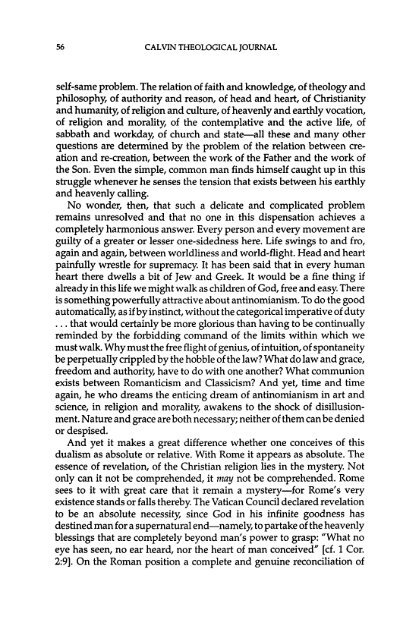Herman-Bavinck-Common-Grace
You also want an ePaper? Increase the reach of your titles
YUMPU automatically turns print PDFs into web optimized ePapers that Google loves.
56 CALVIN THEOLOGICAL JOURNAL<br />
self-same problem. The relation of faith and knowledge, of theology and<br />
philosophy, of authority and reason, of head and heart, of Christianity<br />
and humanity, of religion and culture, of heavenly and earthly vocation,<br />
of religion and morality, of the contemplative and the active life, of<br />
sabbath and workday, of church and state—all these and many other<br />
questions are determined by the problem of the relation between creation<br />
and re-creation, between the work of the Father and the work of<br />
the Son. Even the simple, common man finds himself caught up in this<br />
struggle whenever he senses the tension that exists between his earthly<br />
and heavenly calling.<br />
No wonder, then, that such a delicate and complicated problem<br />
remains unresolved and that no one in this dispensation achieves a<br />
completely harmonious answer. Every person and every movement are<br />
guilty of a greater or lesser one-sidedness here. Life swings to and fro,<br />
again and again, between worldliness and world-flight. Head and heart<br />
painfully wrestle for supremacy. It has been said that in every human<br />
heart there dwells a bit of Jew and Greek. It would be a fine thing if<br />
already in this life we might walk as children of God, free and easy. There<br />
is something powerfully attractive about antinomianism. To do the good<br />
automatically, as if by instinct, without the categorical imperative of duty<br />
... that would certainly be more glorious than having to be continually<br />
reminded by the forbidding command of the limits within which we<br />
must walk. Why must the free flight of genius, of intuition, of spontaneity<br />
be perpetually crippled by the hobble of the law? What do law and grace,<br />
freedom and authority, have to do with one another? What communion<br />
exists between Romanticism and Classicism? And yet, time and time<br />
again, he who dreams the enticing dream of antinomianism in art and<br />
science, in religion and morality, awakens to the shock of disillusionment.<br />
Nature and grace are both necessary; neither of them can be denied<br />
or despised.<br />
And yet it makes a great difference whether one conceives of this<br />
dualism as absolute or relative. With Rome it appears as absolute. The<br />
essence of revelation, of the Christian religion lies in the mystery. Not<br />
only can it not be comprehended, it may not be comprehended. Rome<br />
sees to it with great care that it remain a mystery—for Rome's very<br />
existence stands or falls thereby. The Vatican Council declared revelation<br />
to be an absolute necessity, since God in his infinite goodness has<br />
destined man for a supernatural end—namely, to partake of the heavenly<br />
blessings that are completely beyond man's power to grasp: "What no<br />
eye has seen, no ear heard, nor the heart of man conceived" [cf. 1 Cor.<br />
2:9]. On the Roman position a complete and genuine reconciliation of



